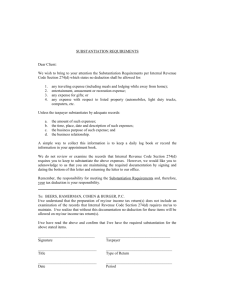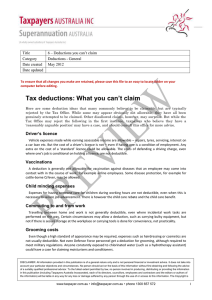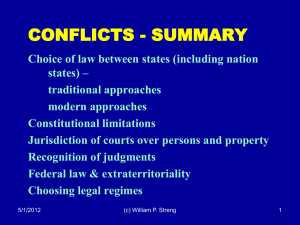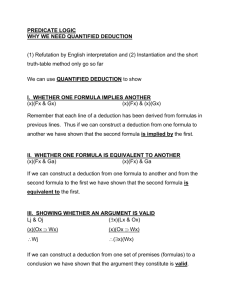Chapter 12 – Personal, Living & Family Expenses
advertisement
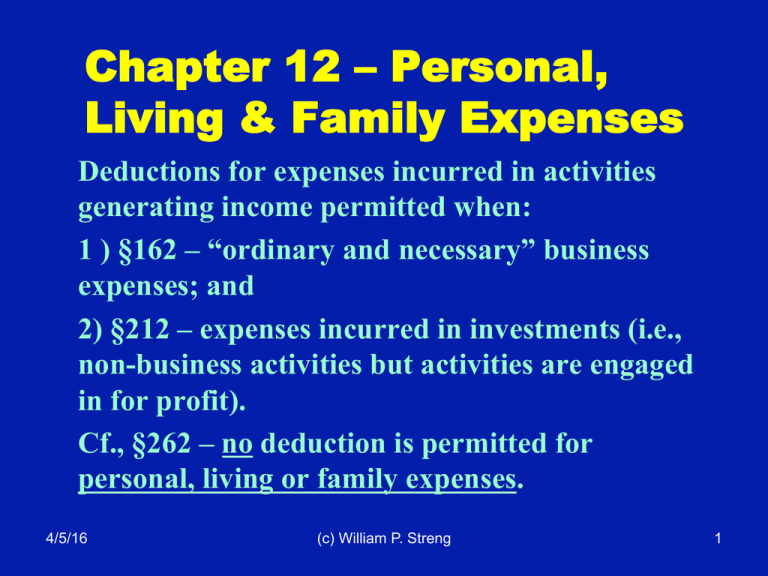
Chapter 12 – Personal, Living & Family Expenses Deductions for expenses incurred in activities generating income permitted when: 1 ) §162 – “ordinary and necessary” business expenses; and 2) §212 – expenses incurred in investments (i.e., non-business activities but activities are engaged in for profit). Cf., §262 – no deduction is permitted for personal, living or family expenses. 4/5/16 (c) William P. Streng 1 Child-Care Expenses Smith v. Commr. P.677 Could a married couple deduct child care expenses since “but for” these expenses the wife (in addition to the husband) could not be employed outside the home? Held: This is a personal expense (i.e., a personal consumption item) and is not deductible. This is not an “ordinary and necessary expense” in carrying on a trade or business. The “but for” causation argument is rejected. 4/5/16 (c) William P. Streng 2 Tax Legislation & Child Care Benefits p.680-681 1) §21 household care credit – possible 35% tax credit for lower income taxpayers, phased out. Maximum credit: $3,000 when one child and $6,000 for more than one child. Credit can also involve the care of an elderly parent living with the taxpayer. 2) §129(a) exclusion available for benefit of employer dependent care assistance program. $5000 maximum exclusion. Nondiscrimination requirement is imposed. 4/5/16 (c) William P. Streng §129(d)(2). 3 Clothing Expenses Pevsner P.681 Employee of an upscale clothing store was required to buy and wear high fashion (YSL) clothing at work to “project the image.” She did not wear this clothing after business. §162 business expense or §262 personal cost? Apply (1) a subjective (personal preference & the taxpayer’s lifestyle) or (2) an objective test (general acceptability of this clothing)? Held: Objective test is applicable (5th Cir., reversing Tax Court decision). Why? 4/5/16 (c) William P. Streng 4 Other clothing situations & deductibility? Police uniform? Cf., Ms. Pevsner’s “uniform”? Formal concert attire for a classical musician? Golf attire for the professional golfer (with branding & identification)? Army fatigue uniform? What about a “loan” of clothing from the employer – constituting gross income (§61)? Should all clothing be assumed to be inherently personal & whatever the style and format? 4/5/16 (c) William P. Streng 5 Correll case Page 684 Travelling Expense Issue re deductibility of “travelling expenses,” i.e., meals and lodging expense. §162(a)(2) permits this deduction when “away from home.” Jury verdict for taxpayer. On appeal: Is IRS “sleep or rest rule” a valid regulation (6th Cir. says no)? What is the purpose of the “sleep or rest” rule? Are significant additional costs incurred then? Relevance of this rule in the tax administration context? Held: This regulation is valid. 4/5/16 (c) William P. Streng 6 Flowers case P.688 Commuting Expense Transportation expenses are deductible when traveling for business purposes. §162(a)(2). Cf., commuting is a nondeductible expense. Flowers – Lived in Jackson, MS & worked in Mobile, AL. He paid his travelling expenses to commute to & his hotel cost in Mobile, AL. Was he “away from home” for business? When travelling was he “in pursuit of business”? Holding: No business relationship; no decision re definition of “home”? 4/5/16 (c) William P. Streng 7 What if taxpayer has two business locations? What if Flowers also conducted business in Jackson? And, he then travelled to his other office in Mobile? Are the travel expenses then deductible? What if the residence location is also a location for a “home office”? 4/5/16 (c) William P. Streng 8 Hantzis P.693 Law student living (with spouse) in Boston and has summer clerkship in NYC. She deducted (under §162(a)(2)) both (1) transportation, (2) apartment cost, and (3) meals in NYC. Were these expenses incurred while “away from home”? Was her “tax home” NYC? Tax Court permits deductibility. Reversed: taxpayer was not “away from home.” Choice of two residences was hers & personal. No business connection with Boston location. 4/5/16 (c) William P. Streng 9 Temporary vs. Indefinite Employment p.697 If holding a temporary job away from home then deductibility for travel & living costs at destination location. Not, however, if an indefinite stay at the new location – treated as if a permanent job. E.g., North Dakota oil workers in the Bakken field. What if a contract is made for a specified period of service? See §162(a) (flush language) that “temporary” can not exceed one year duration. 4/5/16 (c) William P. Streng 10 Rudolph case T&E p.699 Writ of certiorari dismissed as “improvidently granted.” Why? Reference to Duberstein case. Insurance company provided Dallas to NYC trip for agents (and spouses) as a bonus reward. Fact finding is subject to the clearly erroneous rule & no deemed importance of this litigation. Douglas dissent: Business sessions conducted in NYC and on the train. Wife’s expenses are also deductible. She is part of the “community property” team! 4/5/16 (c) William P. Streng 11 Sanitary Farms P. 703 Expenses for African hunting trip paid by Sanitary Dairy as the corporate employer. Dairy claimed deductible amount paid as an advertising expense for the corporate employer. IRS asserts: (1) no deduction to corp. but (2) income to individual shareholders. Held: (1) valid current advertising expense as deductible, and (2) no individual income – but expense incurred by employees for corporation (i.e., no preponderant “personal element”). 4/5/16 (c) William P. Streng 12 Business Lunches – Moss case p.707 Moss as a partner in a defense litigation law firm. Partners (and associates) met for lunch daily at Café Angelo and discussed their cases. Deduction for these lunches? Consider: 1) §262 – no deduction for personal expenses. 2) §119 – exclusion for meals provided in kind on “business premises” (to employees only). 3) §162(a) – ordinary and necessary business expenses as deductible. Other relevant considerations? 4/5/16 (c) William P. Streng 13 Cohan decision p. 711 Result of this decisions: Some business expenses were incurred and some §162 deduction should be available. Remanded to determine an appropriate tax deductible amount. Lack of substantiation did not limit the availability of at least some expense deduction. Does this reward lack of recordkeeping? The response? Code §274. 4/5/16 (c) William P. Streng 14 IRC §274 – Rules Limiting the T&E Deduction p.712 §274(a)(1)(A) – deduction for entertainment expense only if “directly related” to business. No “goodwill” entertainment; but, deduction when expenses are in conjunction with a prior or later business discussion. E.g., expenses for Houston Texans/Rockets/Astros tickets. §274(a)(1)(B) – no deduction for the cost of a facility. E.g., a hunting or fishing lodge. See §274(a)(2) & (3) – limit also for dues to social and athletic clubs. 4/5/16 (c) William P. Streng 15 §274(d) Substantiation Requirements p.714 No deduction for T&E unless substantiation: (1) time, (2) place, (3) business purpose, (4) amount of the expense, and (5) the relationship to the recipients of the entertainment. Contemporaneous records are required. Per diem reimbursement may be acceptable if the time, place and business purpose are properly substantiated. 4/5/16 (c) William P. Streng 16 IRC §274 – Rules Limiting the T&E Deduction §274(m)(3) – no travel expense deduction or exclusion for the spouse - unless the spouse is also on business. See p. 702 (Rudolph case). 4/5/16 (c) William P. Streng 17 Foreign travel deduction limitation p.714 §274(c) – possible expense limitation if combining business and pleasure and more than a one week trip. How avoid this rule? Foreign convention limitation – see §274(h). What is “foreign”? See §274(h)(6) re defining North America. But, seminars & conventions on cruise ships? See §274(h)(2) re U.S. port limitation. “Luxury water transportation” - §274(m)(1). Travel as “education”? §274(m)(2). (p.762) 4/5/16 (c) William P. Streng 18 Reduction for Meals and Entertainment p.715 §274(n) – only 50 percent of any meal and entertainment expenses allowed as a deduction. Purpose of this limitation? Possible alternative approach: disallow the excess cost over cost if no entertainment / business meal? Allocations to deduction/disallowance required when “all-inclusive” price for hotel, meals, etc. Some statutory exceptions - §274(n)(2). 4/5/16 (c) William P. Streng 19 Hobby Losses Bessenyey case P.719 Was profit the primary goal in her horse breeding activities (&, therefore, conducting a business and losses could offset other income)? Tax Court held: she did not have intent to conduct her activities for a profit. Ct. App.: Tax Court determination was not clearly erroneous. Duberstein case. See §183 re limitations on deductions for activities not engaged in with a profit motive. See determinative factors in Reg. §1.183-2(b). 4/5/16 (c) William P. Streng 20 What tax effect of “hobby loss” treatment? Business losses deductible against other income (e.g., compensation & investment income). Otherwise, see the limitations in §183(b) re loss utilization as deductions. How long a period should be allowed for the deduction of “start-up costs”? See §183(b). Require capitalization of start-up costs? But, then a tax basis for future offset in determining gain realized upon asset dispositions. How deal with the personal/pleasure element? 4/5/16 (c) William P. Streng 21 Housing – Loss on Stock Sale Weir case P.726 Sale of preferred stock in a corporation which owned building where the taxpayer had an apartment. Objective of the taxpayer’s stock ownership was to influence the corporation‘s management of the building. Held: Stock was purchased with a profit motive (e.g., to get dividends). Therefore, a loss deduction (under §165(c)(2)) was allowed when this stock was sold for a loss. 4/5/16 (c) William P. Streng 22 Residence Purchase & then Sale P.729 1) Residence held primarily for personal purposes and, therefore, not primarily for investment. Loss on a sale would not be deductible, but (capital) gain included in gross income. Possible gain exclusion - Code §121. 2) What happens when switching from home residence to rental property? Reg. §1.165-9. Possible reduced basis for loss determination. 3) What about rental during the pendency of a sale of the personal residence? 4/5/16 (c) William P. Streng 23 Vacation Home & Rental Losses- §280A P.730 How allocate deductions attributable to rental of a vacation home against both (1) income derived from the rental and (2) other income? Deductions are allowable only to the extent allocable to the rental period. First: allocate the (entire?) statutory deductions (real estate tax and mortgage interest)? §280A(e) - re allocation of maintenance expense. Note rule re less than 15 days rental - §280A(g). 4/5/16 (c) William P. Streng 24 Home Offices Drucker (1983) §280A(a) p.733 Taxpayer as a musician employed by the Metropolitan Opera. Required to practice at his home since no available facilities at the employer’s location. Tax Court held primary place of taxpayer’s business was at the Opera. On appeal: Taxpayer needed to maintain a residential space for practice and his home was the principal place of business. Deduction was permitted (by 2nd Cir) for expenses attributable to that portion of the dwelling unit. 4/5/16 (c) William P. Streng 25 Office in the Home §280A(a) Disallows all §§162, 165, 167, 168 and 212 deductions for a home office or work area in a personal residence. Why? Cf., §262. What if office is “principal office” for trade or business of the taxpayer? §280A(c)(1)(A). See §280A(c)(1) permitting a home office deduction if used for meeting customers. Deduction is limited to offsetting the gross income from that activity (not other income). §280A(c)(5) & allocation (§280A(c)(4)(C)). 4/5/16 (c) William P. Streng 26 Limit on §280A deduction §280A(c)(5) provides for a limit on the office in the home deductions: 1) First deductions are those allocable to the statutory deductions (e.g., taxes and interest). 2) Additional deductions are proportionately allocated to the business use. 3) Possible carryover of unused deductions to succeeding tax year.. No circumvention of rules by having employer home. §280A(c)(6). 4/5/16rent space in employee’s (c) William P. Streng 27 Soliman case Sup. Ct. 1993 P.736 Anesthesiologist spent predominant amount of time in hospital but used “office in the home” for handling administrative details of his medical practice. Claimed expenses relating to use of home space for these business purposes. Tax Court says home office is principal place of business. Aff’d by Ct. of Appeals. Code §280A refers to “principal place of business.” and Sup. Ct. reverses – based on hospital being the principal place of business. 4/5/16 (c) William P. Streng 28 Rev. Proc. 2013-13 Home Office Safe Harbor Safe harbor permitted of $5 per square foot up to a maximum of 300 square feet. This is an alternative to the calculation of actual home office expenses. Still must be exclusive use on a regular basis of this office in the home. Deduction can not exceed the gross income derived from activities in that office in home (& no carryover of the excess to a later year). 4/5/16 (c) William P. Streng 29 Possible Rental to Employer? P.745 §280A(c)(6) precludes circumventing §280A limitation on housing cost deduction by: 1) Renting home office space to employer, and then, 2) Taking an income tax deduction for the cost of rental component of the residence. 4/5/16 (c) William P. Streng 30 Litigation Expenses “Origin of Claim” Doctrine U.S. v. Gilmore (p. 745) & Code §212(2). What §212(2) deductibility of husband’s expenses for attorney’s fees for his successful resistance to wife’s community property claims in their divorce proceeding? No deduction. The husband’s property consisted of interests in three corps. holding auto dealerships. The “origin of the claim” doctrine (a personal divorce matter involved here) applies to deny an income tax deduction for his attorney’s fees. 4/5/16 (c) William P. Streng 31 Patrick case P.751 Fees for Wife’s Expenses Divorce proceeding and amounts paid for (1) rearranging stock ownership in a privately held corporation, and (2) concluding the lease of real property to assure long term rental income stream into a trust. Held: These costs were also incurred incidental to divorce litigation and this divorce origin controlled the tax characterization of these costs as deductible or nondeductible. Difference here – as compared to Gilmore? 4/5/16 (c) William P. Streng 32 Hunter case P.753 No deduction (under § 212) for the costs of obtaining a reduction of alimony (i.e., a reduction of his alimony income tax deduction and, thereby, increasing the taxpayer’s income stream). For § 212 the deduction for the cost of the production of income means the creation of gross income and not the reduction of liabilities. 4/5/16 (c) William P. Streng 33 Wild Case Acq. Divorce Proceeding P.753 Wife reported alimony payments as gross income. Also, she claimed deduction for attorney fees for negotiating alimony payments to be received. Taxpayer asserts legal fees incurred to produce the alimony income & §212 deduction. See Reg. §1.262-1(b)(7), p. 754, re deductible attorneys fees for collection of income (alimony). Regs. (p.754) not changed after Gilmore case. Dissent: Gilmore controls & no deduction. 4/5/16 (c) William P. Streng 34 Gilmore case revisited P.758 Should Gilmore’s (non-deductible) costs in the divorce proceeding (because of “origin of the claim”) be additions to tax basis for the property that was protecting from transfer to other spouse in the divorce proceeding? Court says yes, p. 758? Correct result? 4/5/16 (c) William P. Streng 35 Education and Training P.759 Jorgensen case – p. 759 Courses taken in Greece and Southeast Asia by English teacher to enhance her skills. Held: 1) Deduction not barred by §274(m)(2). 2) §162 expenses to improve her skills as a teacher. These are fact questions. Satisfying both the ordinary and the necessary standards. And, reasonable in amount (fact question). An educational purpose was documented for these expenses under Reg. §1.162-5. 4/5/16 (c) William P. Streng 36 Expenses of Education as Deductible Query re expense: To improve specific skills required in employment and, therefore, deductible under Reg. §1.162-5? Courses merely to improve general competence and were not deductible. What about law school tuition? Capitalize? What about LLM degree tuition costs? What about CLE program costs to an attorney? 4/5/16 (c) William P. Streng 37 Capital Cost Recovery P.770 If capitalization is required (permitted?) then enable amortization over some specific period? Or, should these costs to be “frozen,” (like, previously, goodwill) subject to abandonment loss at time of retirement (e.g., giving up one’s bar license)? Or, on one’s final income tax return? E.g., law school tuition and bar admission fees spread over working career of the attorney (or deductible at retirement)? 4/5/16 (c) William P. Streng 38 Tax Benefits for Education p.772 Scholarships – if qualified, excluded from gross income under §117. Previously noted at p. 189. To be used to pay for tuition and fees and books, etc., but not for room and board. No COD income for cancellation of certain student debt (e.g., community service provided). §108(f). P. 774. 4/5/16 (c) William P. Streng 39 §222 deduction for qualified tuition p.776 Limited deduction for higher education expenses: $4,000 for taxpayer with AGI below $65,000 ($130,000 for joint return) and $2,000 with AGI below $80,000 (but above $65,000; $160,000 for joint return). Not a phase-out, but a “notch” and “cliff” provision. §222 extended thru 2016 in PATH 2015? No §222 deduction if a §25A credit claimed. 4/5/16 (c) William P. Streng 40 §529 Qualified Tuition Program p.778 How established? “Texas Tomorrow Fund,” and others (non-governmental funds)? - Income realized in the account accrues exempt from §61 gross income inclusion. - Distributions are tax-free if made for qualified educational expenses. -Donor controls the investment policy and can change beneficiaries for the 529 account (within the family). - Gift tax and estate tax considerations, 4/5/16 (c) William P. Streng 41 Chapter 12 4/5/16 (c) William P. Streng 42
